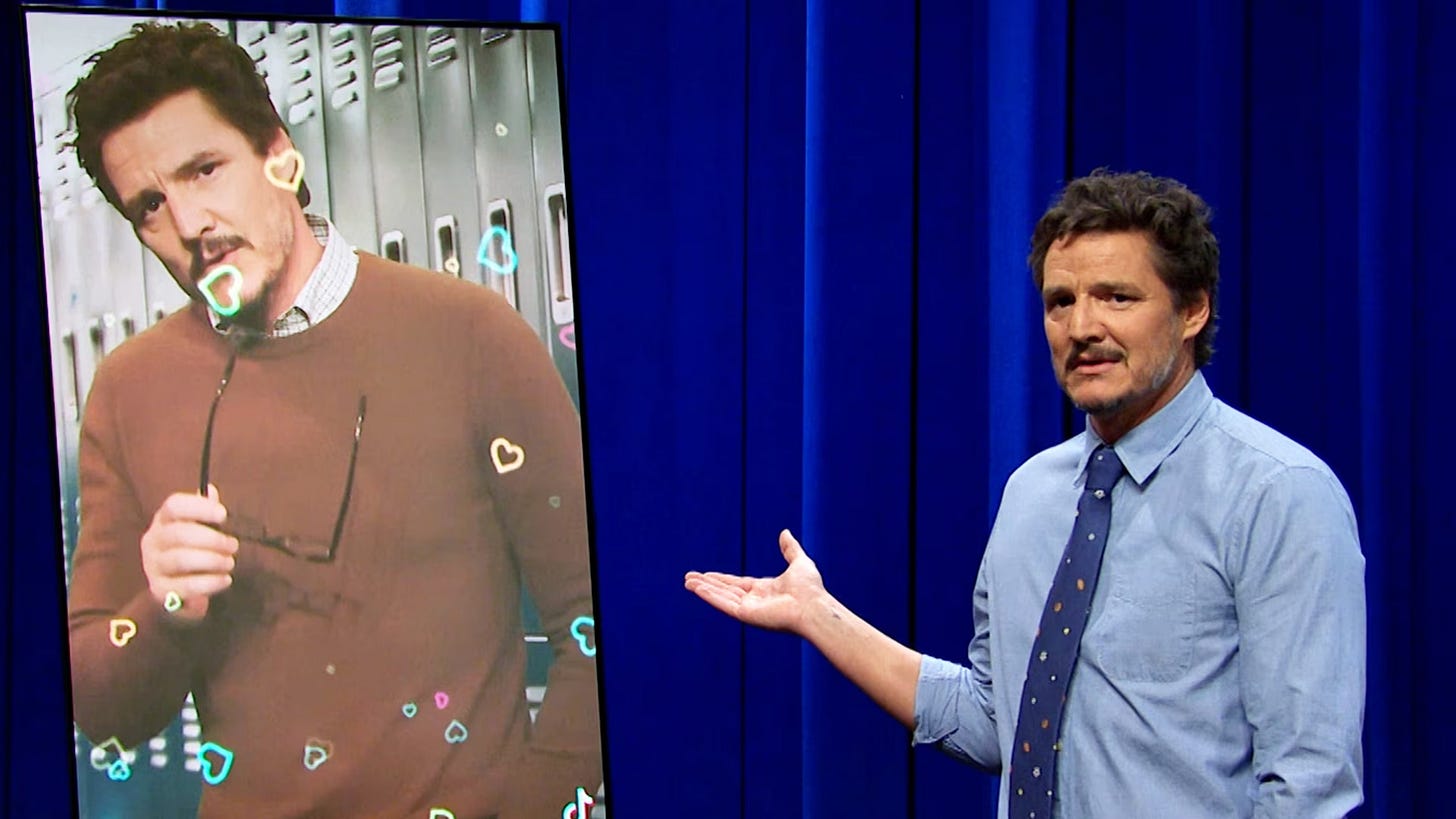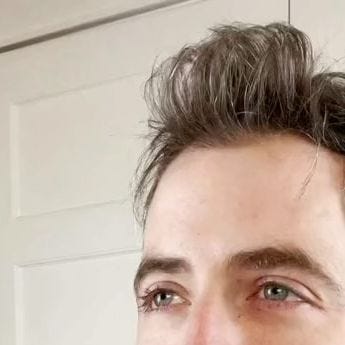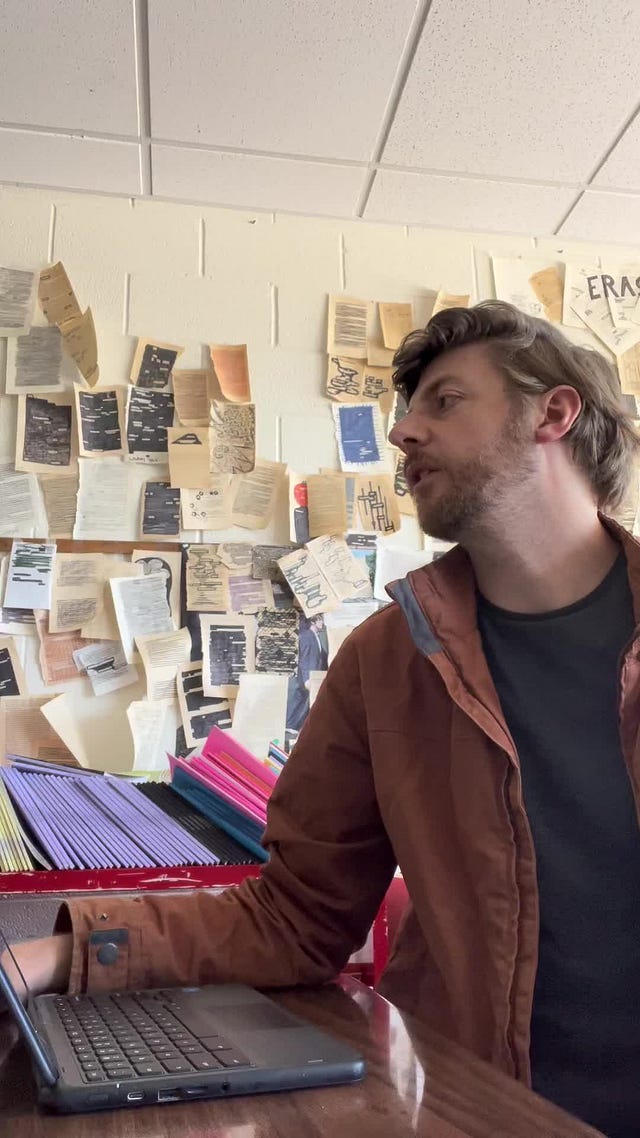
Still, when I saw the video title—“So, I’ve got cancer”—my breath caught in my chest like I had received a text from a friend sharing their diagnosis. I realized, as I teared up watching the video, that Hank Green is probably the first person I ever followed on the internet.
Kate Lindsay reacts to Hank Green sharing his cancer diagnosis, then processes the intensity of that reaction—both for herself and for Green’s fanbase:
“Right? This is so weird,” another replied. “My close friends... I'd be on a plane and baking cookies and lasagnas. How do I give support to someone who is so good and means so much to me/us/this community when they literally don't know I exist?”
What creates such strong attachments between an audience and a public personality or fictional character? Arthur C. Brooks explores how people with avoidant attachment styles are more likely to invest in parasocial relationships, and how this can trigger further distancing from the people directly involved in their lives. Stephen Dubner and Angela Duckworth discuss why our brain feeds on asymmetric relationships. When we know more about someone else, our minds develop a sense that they somehow also know more about us.
Callie Hitchcock takes the long view, exploring the history of criticizing escapist entertainment (or the act of using entertainment as an escape). Emotional engagement with fiction was seen as an act of rebellion, with authority figures accusing readers of displaying a dangerous independence of thought and action. Hitchcock also questions the difference between losing yourself in a good book versus a more direct parasocial relationship fostered by social media:
In offering something much closer to direct interaction, parasociality promises an even more powerful illusion of connection than earlier technologies of escape. It doesn’t frame escape as absorption into a parallel fictional world — as with, say, watching soap operas — but as a real, albeit deeply asymmetrical, relation. Where once the cottagecore-like escapism of watching a film like Little Women played out as vicarious spectatorship, entering imaginatively into the girls’ narrative without the feeling that they were your actual friends, escapism via cottagecore influencers occurs in something closer to real time, creating an illusion of shared experiences more directly.
Ryan Britt informs us about the Baker Street Irregulars, a Sherlock Holmes fan club founded in 1934 that paved the way for modern fandom:
This is why Sherlock was a natural place for modern fandom to start. If fandom prior to the Irregulars was about appreciation, Morley made it about emulation and participation. People can’t be like Professor Challenger from The Lost World, discovering dinosaurs in South America, or Captain Sharkey from Tales of the High Seas, playing pirate. But they can be like Sherlock.
Bringing things back around to the social media side, Lindsay Ellis looks at the carefully manufactured sense of authenticity in influencer videos, and talks with Hank Green about the emotional labor of content creators fostering parasocial relationships with their audience to keep them smashing those like and subscribe buttons. Adenike Fapohunda breaks down how profitable it can be to build parasocial relationships with followers, and the differences between traditional models of celebrity and an influencer (or celebrity taking cues from influencer culture):
[T]here is always a clear distance between me and a traditional celebrity. Beyoncé’s music might hum through the corridors of my house when I am cleaning on a Sunday morning, but she’s not triggering my emotive responses by posting videos of herself doing “catch ups” and filling me in with what’s happening in her life. Although I might be willing to pay a lot of money to see her get ready or do a mukbang with me, I will sadly never have that opportunity.
On the recent 600th episode of Scriptnotes, guest Chris McQuarrie addressed this difference between modern fame and the classic idea of a star, and how stars are essential to the entire entertainment ecosystem:
Chris McQuarrie: There’s not an incentive to be Clark Gable. There’s not an incentive to be Marilyn Monroe. But the business needs those people. People want those icons... It’s not that there was something in the water in the 40’s that’s not there now. There was a system that cultivated those people to be stars, and then the stars themselves understood “This is what I need to do to protect my brand, and to put myself forward.”
Craig Mazin: We identify with certain humans because of a magic they have. The problem that we have is that we have cheapened fame. Fame is useless. Everybody is everywhere seeing each other, and it’s harder to find the signal amidst the noise. It’s hard to figure out who’s a star and who just has a whole lot of followers.
Melissa Ann Tucker also sees an essential tie between fans relating to film stars and the health of the film industry, studying how parasocial relationships influence consumer purchasing decisions:
When asked about whether they intended to see their favorite living film actors in any future films, 36.21% strongly agreed that they intended to, while 32.76% somewhat agreed, and only 2.59% strongly disagreed.
This helped confirm the prediction that participants would be more likely to purchase box office tickets and streaming service subscriptions because of the parasocial relationships they had with their favorite living film actors. This validated the work Nelson and Glotfelty (2012) did on star power equating to box office revenue. Survey participants confirmed that they would be overall more likely to purchase something because their favorite film celebrity was involved.
Are you new here?
Inneresting is a weekly newsletter about writing and things that are interesting to writers. Subscribe now to get more Inneresting things sent to your inbox.
Weekend Read 2 now available in the App Store!
Whether you helped us with the beta test or are just learning about it, we’re proud to share the launch of Weekend Read 2!
Weekend Read 2 fits screenplays perfectly on your iPhone or iPad. No more squint, pinch & zoom when trying to read on the go.
This new update to Weekend Read also makes it easy to add and share notes on a script while on-the-go, and the Read-Aloud feature lets you go eyes-free and listen to your scripts narrated in a range of high-quality voices.
See for yourself—Download Weekend Read 2 from the App Store!
WGA Strike Reading
It’s not just the strike that’s heating up, it’s the weather! Friend of the Quote-Unquote Cinematic Universe Stuart Friedel shared this link to remind everyone on the picket lines about one important way to take care of themselves: Maddeleine Aggeler offers tips for avoiding sun exposure.
Keep up the parasocial relationship with your own characters
Each week we post a comment thread for writers to meet up, cheer each other on, and put some words on the page with a Write Sprint.
What’s a Write Sprint?
John wrote up an explanation, but here’s the short version: Set a timer for 60 minutes, close down all distractions, and do nothing but write until that timer goes off.
Shout out to last week’s Sprinters John Harvey and Aimee Link!
Previously on Inneresting…
In case you missed it, in last issue’s most clicked link Eliza Clark, the showrunner for Y: The Last Man shares an instructional document detailing best practices for writers on set.
Other Inneresting Things
Craig Mod on how returning to drumming after years of avoidance gives him a new meditative activity:
A lot of instrument practice is pure repetition. Just perform a lick, a sticking, a fingering, an arpeggio four billion times. Easy. Now it’s yours. With an electronic kit turned off, it turns out you can do so much of this while watching films. And it turns out, that while having your hands and feet (this is critical, the involvement of the whole body) do X — a simple thing, this X, but still a thing — over and over and over again while watching a movie, your attention on the moving images becomes focused almost as if viewing through a tunnel. The rest of the world falls away. There is no pull to check your phone. You are seated, yes, but moving your hands and feet. The repetition is rhythmic, catalyzes our desired hypnosis, and the mind shifts into a similar state to that of a mind on a walk.
TIL there is a group known as NASA’s Human Adaptation and Countermeasures Office, and it seems like one of the all-time top five objectively impressive places you could say you work at. Troy Farah speaks with scientists about the physical dangers of sending astronauts into space for extended periods.
From Steinberg Draws Cartoons, an illustrated conversation about making choices while living with anxiety:
Reading the room

 Tiktok failed to load.
Tiktok failed to load.Enable 3rd party cookies or use another browser
And that’s what’s inneresting this week!
Inneresting is edited by Chris Csont, with contributions from readers like you and the entire Quote-Unquote team.
Are you enjoying this newsletter?
📧 Forward it to a friend and suggest they check it out.
🔗 Share a link to this post on social media.
🗣 Have ideas for future topics (or just want to say hello)? Reach out to Chris via email at inneresting@johnaugust.com or Mastodon @ccsont@mastodon.art








